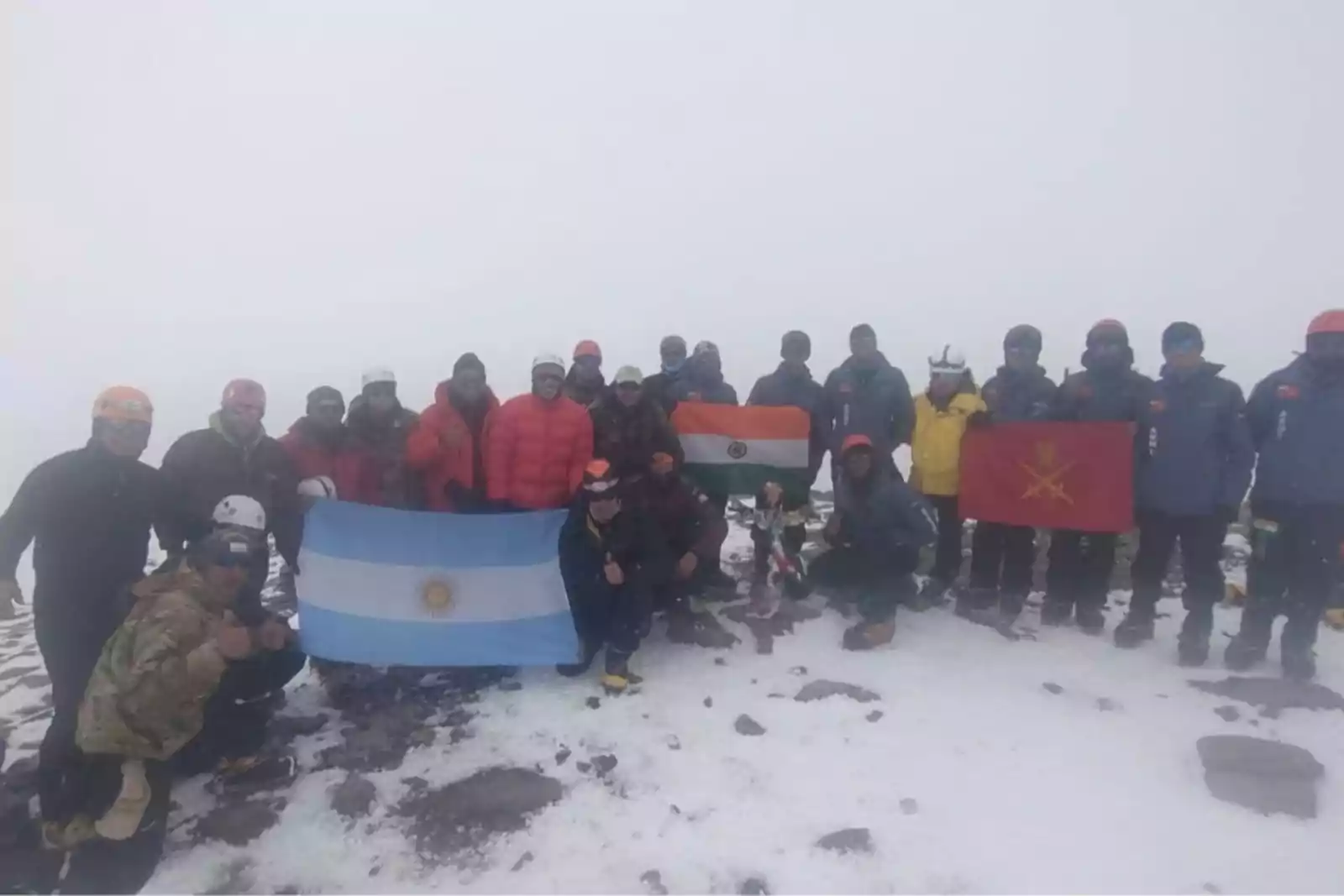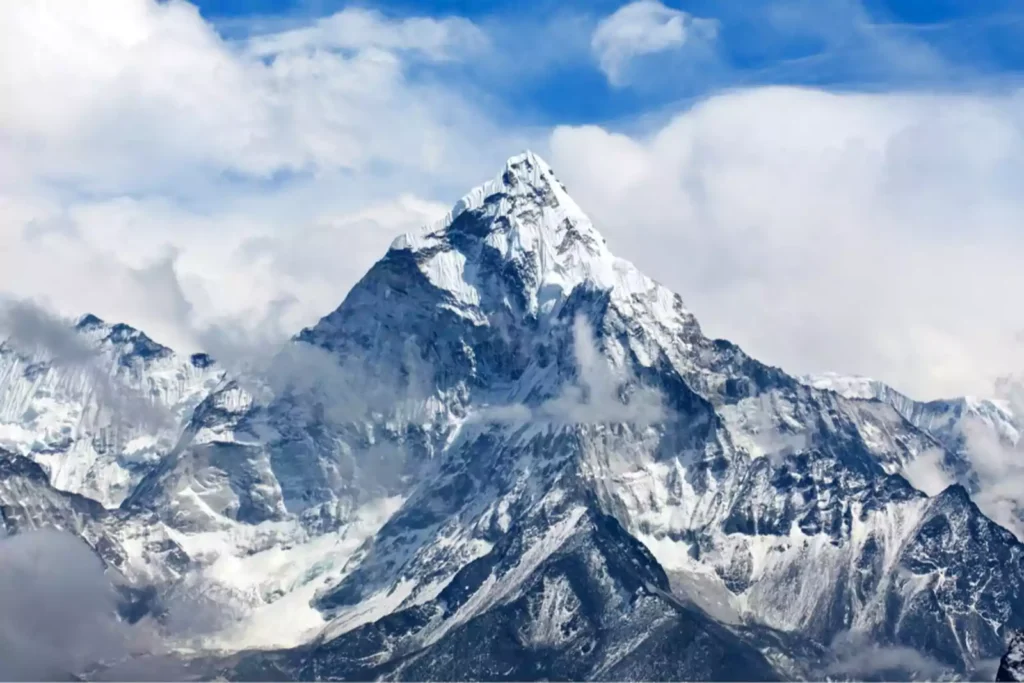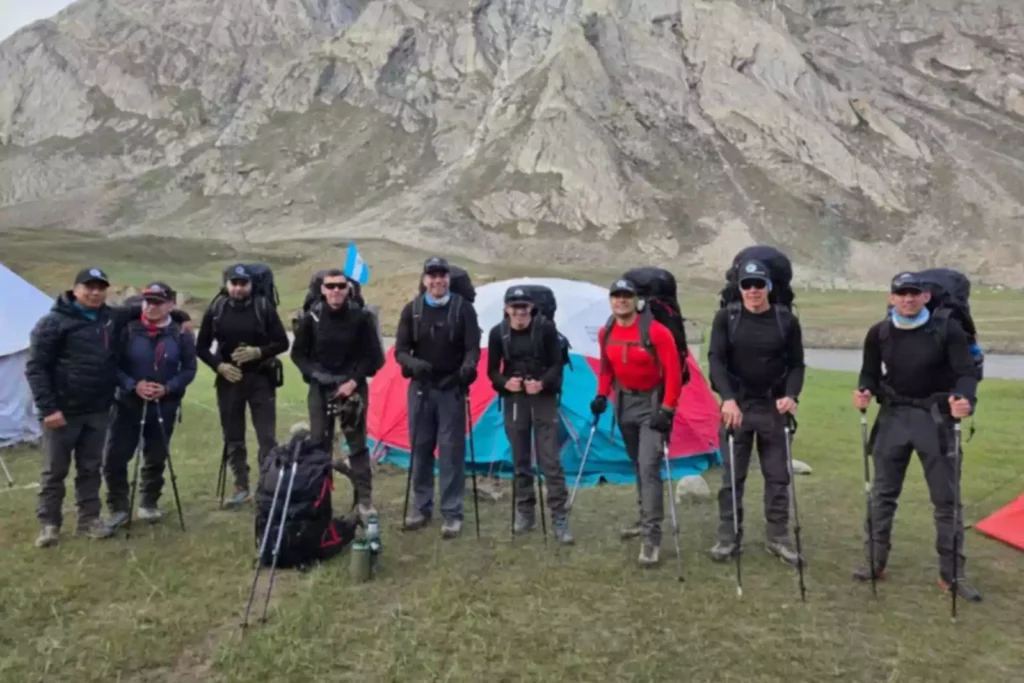Argentine Army Climbs Mount Kun in Historic Himalaya Mission
A team of Argentine Army soldiers successfully scaled Mount Kun in the Himalayas. The expedition, a joint exercise with the Indian Army, strengthens defense cooperation between the two nations. The Argentine Embassy in India hosted the team, recognizing their historic achievement. The ascent, which involved meticulous planning and coordination, culminated in a successful summit.

The members of the binational expedition, Photo: La Derecha Diario
The Argentine Army soldiers who completed the mission to climb Mount Kun, in the Himalayas, at 7,077 meters above sea level, are beginning their return journey to their country. On their final stop of the expedition, they received recognition from the Argentine Embassy in India, hosted by Ambassador Mariano A. Caucino.
In the words of the Argentine Ambassador, it was a “historic mission” carried out in a joint exercise with the Indian Army, which strengthens defense cooperation between the two nations. “It is a source of enormous pride for all Argentines,” Caucino said.
The expedition took place last week, on Tuesday, coinciding with Mountain Troops Day, when a nine-member team of the Argentine Army reached the summit of the mountain for the first time. The trek was carried out alongside Indian army personnel in an operation that combined logistics, training, and bilateral coordination.

The ascent was the result of more than a year of planning. In fact, an Indian Army team, in collaboration with the Argentine Army, successfully summited Mount Aconcagua on Army Day 2025. The joint expedition, which began on January 3, 2025, involved an eight-member Indian team led by Lieutenant Colonel Manoj Joshi and a 15-member Argentine contingent. They reached the summit of the 6,995-meter peak on January 15, 2025.
The Argentine contingent in the Himalayas was composed of Major Ramiro Antoñana (Lobos, Buenos Aires), of the 8th Mountain Brigade Command, Mendoza; Captain Rodrigo Orellano (San Carlos, Mendoza), of the 6th Mountain Engineer Battalion, Neuquén; and Chief Warrant Officer Pedro Rodríguez (Tartagal, Salta), of the 8th Mountain Hunters Company, Puente del Inca.

The Argentine Army patrol, Photo: La Derecha Diario
They were joined by Chief Warrant Officer Néstor Maidana (San Salvador de Jujuy, Jujuy), Chief Warrant Officer Juan Bustos (Puente del Inca, Mendoza), Assistant Sergeant Víctor Giordano (Luque, Córdoba), of the 16th Mountain Infantry Regiment, Uspallata; Assistant Sergeant Carlos Villafañe (Esquel, Chubut), of the Military Mountain School, Bariloche; First Sergeant Oscar Oro
(Cinaguita, San Juan), of the 11th Mountain Infantry Regiment, Tupungato; and First Sergeant Diego Alegre (Captain Bermúdez, Santa Fe), of the Military School of Mounted Troops, Buenos Aires.
In total, the expedition involved 67 people: 17 members of the Indian Army, nine Argentines, 11 avalanche rescue specialists, porters, and administrative staff.
The operation began on July 23 with the departure from Kumathang/Kargil to the Safat Valley, where, at 3,900 meters, the first camp was set up and joint activities with the Headquarters of the 8th Indian Mountain Division began. During the first few days, the group completed the acclimatization process, which included hiking through gorges and boxes, and checking and preparing equipment, medications, and medical supplies. The Indian expedition leader gave talks on the ascent and safety protocols. In parallel, an air evacuation plan was coordinated with the Indian Air Force, and daily medical checks were conducted.
On July 25, base camp was set up at 4,515 meters above sea level. Two non-commissioned officers and two porters remained there, while the expedition leaders conducted an aerial reconnaissance of the route. At the Safat refuge, Indian medical personnel provided training on altitude emergencies, and Argentine troops provided instruction on the use of the Recco radar, a tool used in rescue operations.
On July 28, the entire team moved to base camp and conducted a reconnaissance mission toward Camp 1. Since then, the final phase of preparation began: transfer and distribution of loads to the high-altitude camps, daily medical checks, and constant coordination with Indian military authorities. The final ascent was scheduled for August 4 and 5, when the summit was reached as planned.
Defense Minister Luis Petri celebrated the achievement and published images captured from the summit. On his X account, he wrote: “At 7,077 meters, on the summit of Mount Kun, the nine members of the Argentine Army patrol made history alongside the Indian Army.”





Comments